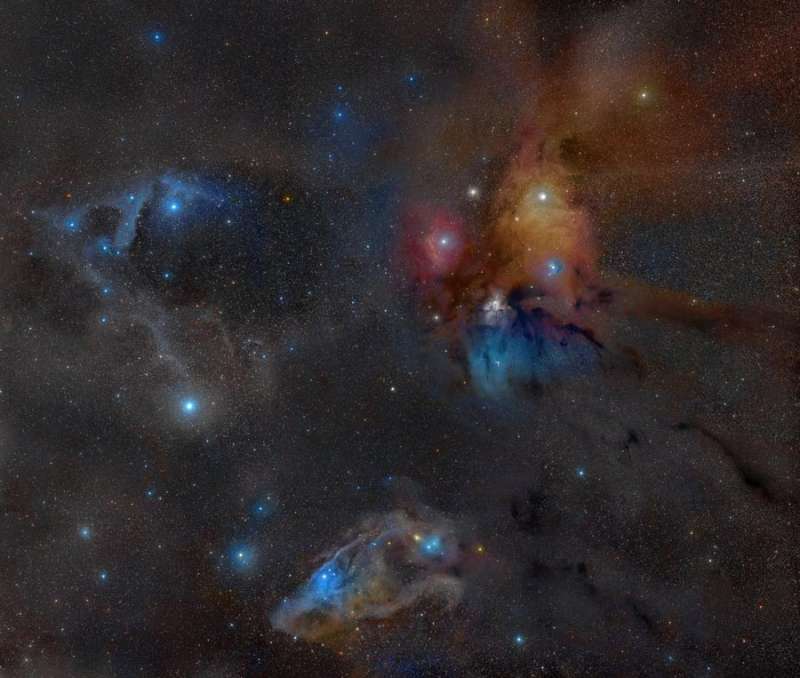Credit & Copyright: Rogelio Bernal Andreo
Explanation:
The clouds surrounding the star system Rho Ophiucus compose one of the closest star
forming regions.
Rho Ophiucus itself is a
binary star system visible in the
light-colored region on the image right.
The star system, located only 400
light years away, is distinguished by its
colorful surroundings,
which include a red
emission nebula and numerous
light and dark brown dust lanes.
Near the upper right of the Rho Ophiucus
molecular cloud system is the yellow star
Antares, while a distant but coincidently-superposed
globular cluster of stars,
M4, is visible between Antares and the red
emission nebula.
Near the image bottom lies IC 4592, the
Blue Horsehead nebula.
The blue glow that surrounds the Blue Horsehead's eye -- and other stars around the
image -- is a reflection nebula composed of fine dust.
On the
above image left is a geometrically angled reflection nebula
cataloged as
Sharpless
1.
Here, the bright star near the dust vortex creates the light of surrounding
reflection nebula.
Although most of
these features
are visible through a small telescope pointed toward the constellations of
Ophiucus,
Scorpius, and
Sagittarius, the only way to see the intricate details of the dust swirls, as
featured above, is to use a
long exposure camera.
1999 2000 2001 2002 2003 2004 2005 2006 2007 2008 2009 2010 2011 2012 2013 2014 2015 2016 2017 2018 2019 2020 2021 2022 2023 2024 2025 |
Yanvar' Fevral' Mart Aprel' Mai Iyun' Iyul' Avgust Sentyabr' Oktyabr' Noyabr' Dekabr' |
NASA Web Site Statements, Warnings, and Disclaimers
NASA Official: Jay Norris. Specific rights apply.
A service of: LHEA at NASA / GSFC
& Michigan Tech. U.
|
Publikacii s klyuchevymi slovami:
Zmeenosec - zvezdoobrazovanie - Oblasti zvezdoobrazovaniya - otrazhatel'nye tumannosti - emissionnaya tumannost'
Publikacii so slovami: Zmeenosec - zvezdoobrazovanie - Oblasti zvezdoobrazovaniya - otrazhatel'nye tumannosti - emissionnaya tumannost' | |
Sm. takzhe:
Vse publikacii na tu zhe temu >> | |
